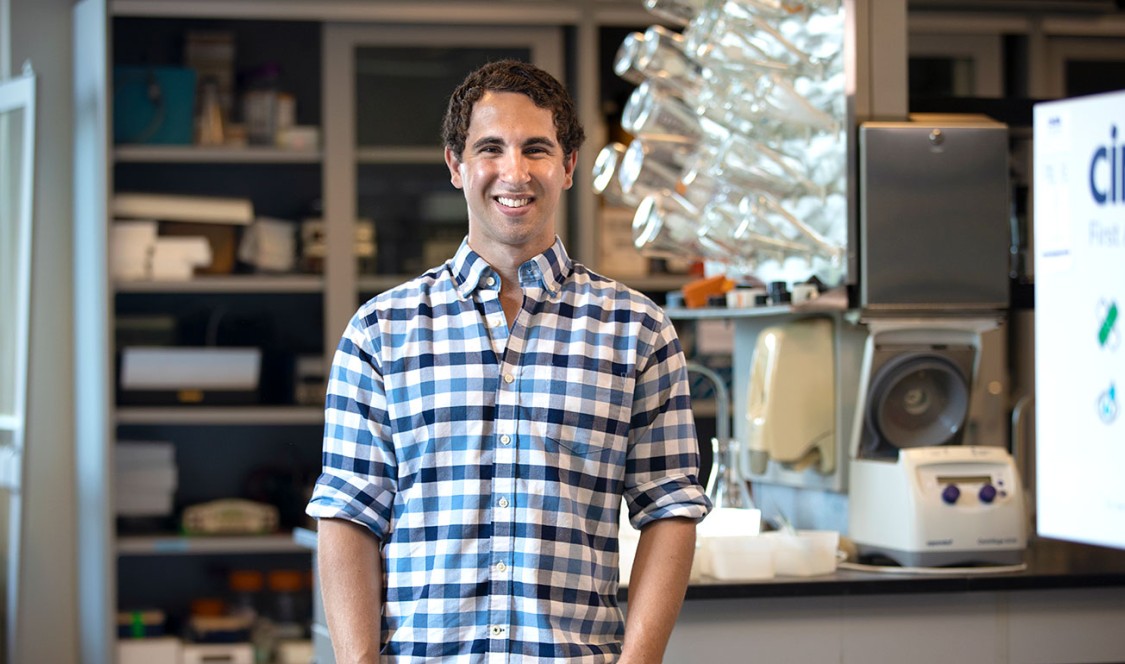The spark: “My dad taught high school science in Portland before becoming an insurance agent in Montana. My mom teaches general sciences at an elementary school. Growing up in Montana, we’d go hiking every weekend in the summer. My parents were Mr. and Mrs. Nature. A bird would call in a tree; my dad would answer back and tell me what kind of bird it was. We looked at fossils in rocks that we picked up on hikes. When we’d catch fish in summer or go ice fishing in winter, we’d talk about the biology of fish and how they survived in cold waters.
- Connor Bloom ’19
- Hometown: Whitefish, Montana
- Major: Science management with a concentration in biotechnology
- Activities: Admission senior interviewer and tour guide; ASCMC: campus improvements, administrative affairs and appropriations, and president pro-tempore; First-Year Guide; chair of CMC Art Council; co-director of Impact at the Kravis Leadership Institute
“In high school, I kind of decided, ‘OK, let’s not be (so science-focused) anymore.’ I had planned to take biology early, just to get it out of the way. But I immediately became fascinated by my courses—specifically, how genetics intersected with the evolution of life, how genetics form basic building blocks. I ended up taking more advanced courses in nuclear and organic chemistry, genetics, plus a couple of economics classes—it was all interesting to me. I realized, ‘OK, maybe I don’t want to spend my time in a lab, but I love reading about advancements.’ I wanted to know how hospitals worked, how the world worked, basically how things come together. That started me on the path of pairing science with economics.”
Why CMC: “I had a high school adviser tell me, ‘Connor, you’ve got a little bit of ‘change the world’ in you. Remember, it’s easier to change it from the inside.’ I knew I wanted to pursue science in college. But I was also thinking about an applied route through business and economics. Basically, where could I do everything? That’s when I found out about science management at CMC. This was the only college I visited where I didn’t have to choose between science and economics. Everyone else said, ‘You can be a biochemistry major. Oh, and then the economics school is in that other separate college way over there.’ I wasn’t looking to be a biochemistry major with an economics minor, or vice versa. I wanted the interdisciplinary skills to come together in a really integrated and seamless major. I mean, I wrote about it in my CMC application. I think the exact first line was, ‘Science management is the major I want to pursue. Period.’”
Course connections: “We did a lot of case studies in one of my advanced economics courses, Entrepreneurial and Venture Capitalism Finance. When we were looking at IPO (initial public offering) data for biopharma and pharma companies, I noticed that some of my peers who were purely finance-driven struggled a bit. The pharma model is so different from tech companies, and that’s where I felt my science knowledge really pay off. I was able to more accurately model financial metrics because I understood the high start-up costs for pharma. And for the pure science side, because I had read so much primary literature, I already knew what questions to ask. When a lot of people were confused as to why a really great trial run of a product wasn’t closer to funding, I could turn on both lenses. Is it profitable? Beyond results, what else could be holding it back? I knew to talk about the barriers to scientific progress that are purely financial.”
Get involved: “I’ve probably taken on too much at CMC. (Laughs). But whether it was with ASCMC or as a First-Year-Guide or my role with the Art Council, I wanted to focus my extracurriculars on having the most impact at CMC. How could I give back? And what opportunities would help those that follow me? Because, to me, that’s really what makes CMC great. Everyone here is so naturally curious, so motivated to try their own thing. That informs what you’re willing to take on and who you can become, because we’re constantly asking each other at lunch, at dinner, outside the classroom, ‘Hey, what are you doing next summer? What research are you working on? How can I get involved with that?’ You’re constantly assessing all of these opportunities and what skills you may have to complement someone else’s work.”
Future: “I’ll be working as a consulting analyst at Accenture in Denver after I graduate. Consulting felt like a natural track. I’ve spent a lot of time in science and economics, but ultimately I’m still guided by liberal arts learning. While I do eventually see myself focusing more intensely on biotechnology practices, I want to gather some broad skills first. Because that biotech interest isn’t going anywhere. It’s been deepened by my CMC experience.”
On leaving: “I’ve learned so much here. But what I take away the most is something that others at CMC constantly taught me. Be humble. You will never know everything. So, when you walk into a room, be open about the things you don’t know. I think that spirit is epitomized by people like outgoing ASCMC president Maya Love ’20, by Dianna Graves ’98 in the Dean of Students office, by so many professors I’ve worked with. People at CMC are incredibly open to conversation. To have peers and profs say, ‘Let’s talk as equals here’—and assume the best intent in one another—that’s a valuable skill that I’ll carry for the rest of my life.”
—Chahat Kaur ’21

